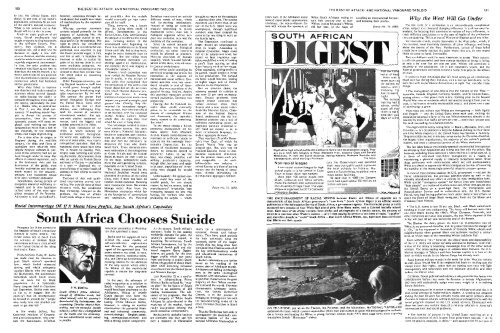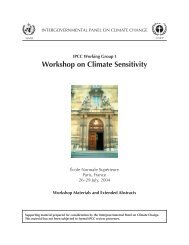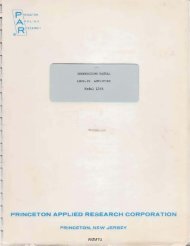THE BEST OF ATTACK! AND NATIONAL VANGUARD TABLOID
THE BEST OF ATTACK! AND NATIONAL VANGUARD TABLOID
THE BEST OF ATTACK! AND NATIONAL VANGUARD TABLOID
Create successful ePaper yourself
Turn your PDF publications into a flip-book with our unique Google optimized e-Paper software.
180 <strong>THE</strong> <strong>BEST</strong> <strong>OF</strong> <strong>ATTACK</strong>! <strong>AND</strong> <strong>NATIONAL</strong> <strong>VANGUARD</strong> <strong>TABLOID</strong> <strong>THE</strong> <strong>BEST</strong> <strong>OF</strong> <strong>ATTACK</strong>! <strong>AND</strong> <strong>NATIONAL</strong> <strong>VANGUARD</strong> <strong>TABLOID</strong> 181<br />
to cite, the United States, with<br />
about six per cent of the world's<br />
population, consumes 30 per cent<br />
of the world's mineral resources.<br />
What is not pointed out is that<br />
Brazil will try to do the same.<br />
Until the nasty problem or oil<br />
arose, liberal intellectuals had<br />
taught everyone to sing hosannahs<br />
to the Affluent Society. Pros-<br />
perity, they ululated, was a<br />
conscious act. All it took was the<br />
decision to apply a few well-<br />
proven theories, and the economy<br />
could be made to work as well as a<br />
su pesbly engineered chronometer.<br />
In fact, the only problem that<br />
remained was figuring out how to<br />
distribute the wealth created, a Far<br />
more complicated proposition<br />
than the traditional concern about<br />
production which had bedeviled<br />
earlier generations.<br />
What they failed to mention<br />
was that they had really created an<br />
economy whose survival depends<br />
on redistributing the ability to<br />
consume throughout every class in<br />
the society, particularly the poor<br />
(i.e., Blacks, who, as pointed out<br />
in Part I, are the ideal con-<br />
sumers). If anything should hap-<br />
pen to thwart the process of<br />
consumption, then the entire<br />
economic system will comc un-<br />
glued. And nothing can thwart<br />
consumption more than a lack of<br />
raw materials, or raw materials<br />
whose cost keeps skyrocketing.<br />
For a time after its origins in<br />
England during the mid-18th<br />
century, the ebbs and flows of<br />
capitalism were relatively mild,<br />
largely because substantial por-<br />
tions of the economy had not yet<br />
been brought under its sway. But<br />
efforts to extend capitalism, such<br />
as the Enclosure Acts and the<br />
destruction of the guilds, were<br />
forcibly undertaken and brought<br />
much misery to the peasants,<br />
artisans, and tradesmen whose<br />
lives were ruthlessly dislocated.<br />
Nonetheless, during periods of<br />
prosperity material weI1-being in-<br />
creased, and in time legislation<br />
curbed some of the most egre-<br />
grious excesses of the factories.<br />
Adversity struck periodically,<br />
however, sometimes through natural<br />
causes but usually as a result<br />
of machinations by the capitafist<br />
l~imsel f.<br />
Whereas previous economic<br />
systems existed prima-rily for the<br />
purpose of sustaining life, the<br />
capitalist system existed to pro-<br />
duce profits for the capitalist. His<br />
right to profit was considered<br />
absolute, and in its exercise he was<br />
permitted, even expected, to pay<br />
the lowest possible wages; to hire<br />
and fire at will; to liquidate his<br />
business in order to realize his<br />
gains or to reinvest them in even<br />
more profitable endeavors. An<br />
entire literature of apologetics was<br />
created to show how private vices<br />
like greed ended up becoming<br />
public gains.<br />
Other European countries, see-<br />
ing England transform itself into<br />
a world power through capital-<br />
ism, also began introducing capi-<br />
talist organization. By the mid-<br />
19th century the system had<br />
spread throughout Europe and<br />
the United States. Soon other<br />
nations, to the best of their<br />
abilities, were challenging Eng-<br />
land or control of lucrative<br />
inte~.national markets. But sys-<br />
tern-wide crashes continued to<br />
worsen, until the biggest and<br />
baddest occurred in the 1930s.<br />
The Great Depression of the<br />
1930s, in which millions of<br />
productive workers through'out<br />
the world were suddenly thrown<br />
into utter destitution, very nearly<br />
extinguished capitalism. Had this<br />
happened, there would have been<br />
few to mourn its passing. For,<br />
despite mass sufferirqj and seeth-<br />
ing discontent, the economic elites<br />
who sat astride the United States<br />
and most of Europe - capitalists<br />
to a man - displayed the re-<br />
sourcefulness of so many heads of<br />
cabbage in their efforts to resolve<br />
the crisis.<br />
Everyone of their well publi-<br />
cized interventions proved una-<br />
vailing. Not only did none of their<br />
measures work, but conditions<br />
kept worsening. Unequal to the<br />
problem, the men of affairs<br />
finally took refuge in the theoreti-<br />
cal possibility that the malady<br />
would eventually go into remis-<br />
sion all by itself.<br />
Time, however, was a luxury<br />
that the ruling elites could ill<br />
afford. Developments in the<br />
Soviet Union, Italy, and Germany<br />
threatened to overthrow the status<br />
quo. Growing armies of the<br />
unemployed were beginning to<br />
think that conditions in the Soviet<br />
Union and Italy, bad as they were,<br />
might be more tolerable than in<br />
the West. But the ruling elites<br />
found Germany especially un-<br />
settling; against all expectations,<br />
the economy there was staging a<br />
remarkable recovery.<br />
However much capitalists may<br />
have reviled the Russian Revolu-<br />
tion in public, in the privacy of<br />
their clubs they recognized that<br />
the seriousness of the communist<br />
chreat depended on the accuracy<br />
with which Marxist dialectic pre-<br />
dicted the fulure. A strong<br />
tradtion of empiricism made them<br />
suspect, on general principles, and<br />
general idea. Clearly, they dis-<br />
counted the immediate danger;<br />
then, as now, they were not afraid<br />
to do business with the supposed<br />
enemy, despite Lenin's fabled<br />
words that the rope they sold<br />
would be used to hang them.<br />
The real danger seemed to come<br />
from another quarter. Not only<br />
were Hitler's National Socialists<br />
hostile to capitalism and commu-<br />
nism as political ideologies, but<br />
they also had the effrontery to<br />
denounce the Jews who domi-<br />
nated both. These denunciations<br />
were intolerable to the ruling elites<br />
in Great Britain and the United<br />
States as much for their truth as<br />
for the large, sympathetic audi-<br />
ences that were gathering to listen,<br />
especially in the United States.<br />
The ideas propounded by the<br />
National Socialists would have<br />
provoked the animus of the ruling<br />
elites, even if there had been no<br />
ticklish f ewish question. Drawing<br />
their inspiration from Darwinian<br />
biology rather than from the<br />
Newtonian mechanics which lay<br />
at the foundation of communism<br />
and capitalism, the National<br />
Socialists constructed an entirely<br />
different model of man, which<br />
had far-reaching implications.<br />
Instead of being an atom-like<br />
creature responding to purely<br />
mechanical forces, man was a<br />
biological organism whose pur-<br />
pose was evolution; race was the<br />
modality of that evolution.<br />
Since the central purpose of<br />
human existence; was biotogical<br />
evolution, no other interests<br />
would be allowed to interfere.<br />
Marxist doctrines of human<br />
equality, which fostered hybridi-<br />
zation of the races, were obvious-<br />
ly coun ter-evolutionary .<br />
But neither; could capitalists be<br />
permitted to gouge out profits for<br />
themselves at the expense of<br />
national and racial welfare. Eco-<br />
nomic activities were not consi-<br />
dered valuable in and of them-<br />
selves; they were secondary td the<br />
good of the race. And yet, despite<br />
this seemingly insouciant attitude<br />
toward economics, Germany was<br />
prospering.<br />
Fearing that the National So-<br />
cialist ideas would eventually<br />
prove to be irresistible 'to the<br />
masses of unemployed Britons<br />
and Americans, the capitalists<br />
dearly wanted to do something.<br />
But what?<br />
To the rescue sprang a British<br />
economist distinguished Tor his<br />
many talents: John Maynard<br />
Keynes. Keynes could discover no<br />
necessary or sufficient reason to<br />
account for the seemingly inter-<br />
minable Depression. By the<br />
canons of established economic<br />
theory, no obstacles existed to<br />
prosperity. Labor, to say the<br />
least, was cheap, pientifut, and<br />
wi lling ; productive capacity,<br />
though idled, lay intact and ready<br />
to be used; manufdcturtrs' inven-<br />
tories were clogged by unsold<br />
goods.<br />
Unfortunately, the typical con-<br />
sumer could buy none of the<br />
unsold goods, for one simple<br />
reason: he had no money. And as<br />
manufacturers' inventories kept<br />
increasing because no one was<br />
buying, the workers who were<br />
producing the surplus - which<br />
brought no return to the capitalist<br />
- also lost their jobs. The process<br />
continued until more than 25 per<br />
cent of the U,S. labor force was<br />
unemployed, though significant<br />
numbers may have escaped the<br />
statistics by returning to work on<br />
the family farm.<br />
The Depression continued to<br />
linger, despite m unprecedented<br />
drop in wages. Awarding to<br />
classical economics, wages could<br />
fall to the subsistence level, but<br />
sooner or later ingenious capi-<br />
talists would find a way of turning<br />
a profit from putting an idled<br />
labor force to work at low wages.<br />
Other capitalists, seeing profits to<br />
be gained, would decide to invest<br />
in new production. The demand<br />
for labor would Increase, leading<br />
to higher wages and an instant<br />
solution to the Depression.<br />
But no solution came; the<br />
economy seemed to stabilize at<br />
just over 25 per cent unemploy-<br />
ment. Drastic problems often<br />
requi~e drastic solutions that<br />
violate common sense. Once<br />
Keynes and a few ast.ute indivi-<br />
duals like Marriner Eccles, Chair-<br />
man of the Federal Reserve<br />
Board, understood that the fun-<br />
damental problem was a lack of<br />
sufficient purchasing power, an<br />
ingenipus solution presented it-<br />
self: hand out money - or, in<br />
more circumspect language, sti-<br />
mulate aggregate demand.<br />
Thus was born Franklin Roose-<br />
velt's New Deal, of which the<br />
Second World War was an<br />
integral part. Not only was the<br />
National Socialist threat to inter-<br />
national capitalism eliminated,<br />
but the greatest make-work pro-<br />
ject imaginable - the multi-<br />
billion-dollar war industry -<br />
solved Keynes' problem of putting<br />
money into the hands of consu-<br />
mers, thereby stimulating the<br />
all-important aggregate demand.<br />
P.Y.<br />
(Issue No. 73, 1979)<br />
every turn. If the Afrikaner trend White South Africans voting to avoiding an international boycott<br />
toward materialistic opportunism turn their country over to non- and boosting their ~rofits. Why the West Will Go Under<br />
continues, the not-so-distant fu- Whites, just as ~hodesia's Whites<br />
ture will witness the spectacle of did last year, in the hope of<br />
The life cycle of a civilization is an extraordinarily complicated<br />
No' 741 1980)<br />
affair, subject to a thousand changing - - influences. It is all too easy for<br />
r<br />
/ SOUTH AFRICAN<br />
* analysts, bv fo.cusing their attentions on various of these influences, to<br />
1<br />
reach differing conclusions as to the state of health of the civilization<br />
they are studying. This is as true of Weslern civiiization as of any other.<br />
Yet there are trends, cl,early observable in the West today, which, if<br />
not reversed, must inevitably dominate all other influences and bring<br />
about the d.emise of the West. Furthermore, certain of these lethal<br />
trends have already reached the point where they are, by any means<br />
likely to come to hand, irreversible.<br />
This is a difficult truth For most Americans to accept. Their country<br />
is still rich and powerful, and their average standard of living is Calling<br />
at only a bit over five per cent per year. Whites still constitute a<br />
majority of the population, life is still reasonably secure, and the<br />
Federal government still seems to have a fairly firm grip on the affairs<br />
Eight of the high school pupils who decided to form a nun-racial student league. They<br />
are (rear from left) Gregory le Roux, Marianne Frey, Suzanne Cope and Donald<br />
Mdondana. -~ - - In front are Susan Erasmus, Ashley, Kasana, Mathews Gantsho and<br />
Vanessa Galn, all of the Cape Penlnsuls<br />
The Argus<br />
Non-racial league<br />
A nm-,racial studsn t league for high<br />
school pupils is to be formed in Cape<br />
Town to break down race barriers.<br />
More than 120 senior pupils from<br />
cury the Government was satkfied<br />
that it was doing all it could to provide<br />
the best schdols for hdians. No-<br />
where in South Africa, he added, were<br />
there'better facilities.<br />
He said that in 1966 the Govern-<br />
Black. Colovred and White schools men! had spent aboul R2- mi\l\on on<br />
made the decision after a discussion at ndlan schools,<br />
the University of Cape Town. The work- - -- ...<br />
shop was organised by UCT's Centre for<br />
S t u l<br />
Heat was<br />
room (sun ro<br />
tor panels ov<br />
heat to war<br />
night.<br />
The occupa<br />
heating had<br />
winter, while<br />
asset all<br />
them la hold<br />
entertain gu<br />
days of wint<br />
of state.<br />
It seems to mast Americans that life must surely g,o on indefinitely<br />
much as it has during their lifetimes, with a few ups and downs, to be<br />
sure, but with no permanent discontinuity in sight, Yet, consider these<br />
things:<br />
The immigration of non-Whites into the nations of the West -<br />
Australia, Canada, England, Germany, Sweden, and the United States,<br />
among others - has grown from almost nothing prior to the Second<br />
World War into an avalanche which increases its strength from year to<br />
year, is fed from a virtually inexhaustible source, and shows every sign<br />
of continuing to grow,<br />
More than one million non-Whites are immigrating - both legalIy<br />
and illegally - into the United States alone each year, shifting the<br />
population balance in favor of the non-White minorities already in the<br />
country by more than half a per cent per year - more than two per cent<br />
for each succeeding presidential election.<br />
The organized minority voting blocs - Blacks, Mexicans, Jews, and<br />
Orientals - are determined to keep the balance shifting in their favor<br />
until the White majority in the United States has become a minority.<br />
They are solidly backed in this determination by the Christian churches,<br />
the largest labor organizations, the majority of the nation's political<br />
leaders, and even a substantial portion of the White electorate.<br />
The few labor - bosses - who initially opposed uncontrolled immigration<br />
are dropping their opposition and<br />
into line with the others. Big<br />
business, including those sectors of it relatively free of Jewish control, is<br />
in favor of continued non-White immigration as a means of<br />
maintaining a plentiful supply of relatively inexpensive labor. Even<br />
those politicians with constituencies which are still predominantly<br />
White are afraid to oppose non-White immigration for fear of incurring<br />
the hostility of the increasingly powerful minority pressure groups.<br />
In view of these political realities the U.S. government - not just the<br />
Carter administration, but previous administrations as well - has<br />
virtually abandoned any effort to enforce its own immigration laws.<br />
While special "emergency quotas" for Soviet Jews and lndochinese<br />
"boat people" are instituted to allow more non-White immigrants into<br />
the United States on a quasi-legal basis, the Immigration and<br />
Naturalization Service and its enforcement arm, the U.S. Border<br />
Patrol, have had the rug pulled out from und.er them in their efforts to<br />
check the flood of illegal Black immigrants from the Caribbean and<br />
C'hicanos from Mexico.<br />
Racial Intermarriage OK If It Means More Profits, Say South Africa 's Capitalists<br />
<strong>THE</strong> ENCOURAGEMENT <strong>OF</strong> RACIAL MIXING between Blacks and Whites of opposlle sex is<br />
characteristic of the South African government's "new look." South Afdcan Mgest is an official wecMy<br />
publicetloa of the information ~ervi& of South Africa, a government ogeacy. The idterr~cid group proudly<br />
~ J S P ~ here P Y ~ consists of four White high sebool girls, three Black males, and a colored (mcially mixed)<br />
The U.S. Army is now 30 per cent Black, with Black enlistments<br />
South Africa Chooses Suicide<br />
Prospects for Whj te survival in<br />
American journalists in Washing- At the present, South Africa's voters by a combination of<br />
the Republic of South Africa have<br />
ton that apartheid is dead. economy, fueled by the soaring economic threats and induccdimmed<br />
in recent months. The<br />
worldwide demand for gold, the ments. They have good grounds<br />
threat comes not so much. from<br />
Botha and his supporters have country's principal export, is for their optimism, since the<br />
the activities of militant Black<br />
offered the usual medley of booming. Nevertheless, South economic power of the Anglonationalists<br />
as from a crisis of will<br />
self-contradictory explanations African businessmen, led by the Jewish elite has long since been<br />
in the highest circles of the ruling<br />
and &cuses for the proposed influential Jewish gold and dia- translated into effective control of<br />
Nationalist Party.<br />
repeal of the apartheid laws. The mond magnate Harry Opperr- the key communications media<br />
prime minister has cited, in turn, heimer, are greedy for the even and educationd institutiom of<br />
Prime Minister Pietej W. Botha<br />
national security, economic neces- bigger profits which can come South Africa.<br />
has made clear his intention to<br />
sity, and Christian brotherhood as from continuing to exploit South Botha's calculations are further<br />
junk South Africa's apartheid<br />
pressing reasons for the abolition Africa's huge pool of cheap Black based on his reading* of the<br />
laws, Which forbid interracia1<br />
of the only system which offers Eabor while attracting increased present state of Afrikaner morale.<br />
mixing and which stringently<br />
the Whites of the multi-racial investment from the United States Afrikaners are fdling increasingly<br />
regulate Blacks who live outside<br />
republic a chance for long-term and Western Europe.<br />
prey to the same - shortsighted<br />
the Bantustans, the autonomous<br />
survivd .<br />
Last November 22 at a confer- obsession with immediate materihomelands<br />
which S'outh Africa<br />
ence in Johannesburg Prime al gain that characterizes the great<br />
has set aside for its Black<br />
In the past, the advocacy of<br />
Minister Botha outlined his "mas- majority of their White counterpopulation.<br />
At a Nationalist<br />
racial integration as a solution to<br />
ter plan'' for the future of South parts around the world. The most<br />
Party congress held En Capetown<br />
P.W. BOTHA<br />
South Africa's race problem<br />
Africa to an audience of 250 characteristic Afrikaner institulast<br />
September, Botha even went<br />
would have been anathema to the<br />
leading businessmen. The sub- tion, the Dutch Reformed<br />
so far as to suggest that the Sou rh Afdca 's prime minister, Afrikaners, Whites of chiefly<br />
stance ~f his proposals, that the Church, is in the process of<br />
country's ban on miscegenation though of Afrikaner stock, has Dutch: descent who form the<br />
racial integrity of White South bringing its theology into line with<br />
be relaxed to provide for "people allied himelf with his country's Nationalist Party's main consti-<br />
Africans be subordinated to the the race-destroying credo of the<br />
who really love one anothe~ and deraclnated big burlnessmen, the tuency. Prime Minister Botba,<br />
workings of the market, found other Christian churches in South<br />
want to get married."<br />
racmhing Chrktlan church hier- however, is relying on another<br />
archies, and the powerful Jewish constituency: the ~owerful finan- ready acceptance among the Africa.<br />
A few weeks before, Pi& minority which ??.~zs u stranglehold cid and industrfd community, prof't-conscious entrepreneurs. Thus far Botha has been able to<br />
Kmrnhof, Minister of ~oo~enr- on the medh and the economJI- overwhelmingly English-speak- Bob and his capitalist backers outmaneuver the essentially contion<br />
and Development, who over- & subordinated rflchl vfllum ing, cosmopolitan-minded, an# are confident that they can win servative leaders of the ramie~<br />
the Rantustans, informed lopro!- with a strong Jewish component, over a majority of Nationalist minded Afrikaner Nationalists at<br />
nude. JQfh issue of the Digest contains news stories and photographs of similar nature, the purpose of running at 35 per cent and growing. The Army will become more than<br />
which is lo eonvlace other Western nations - all of them paying lip ~ d cto e the myth of meid "equdity" one-third Black during the 1980's. When Chicanos, Orientals, and<br />
and, therefore, hostile to "racist" South Afrlca - that South African Whltcs, too, have now &n convinced other<br />
Army<br />
minorities<br />
will pass 40<br />
are<br />
per<br />
taken<br />
cent<br />
into<br />
before<br />
account,<br />
the end<br />
the<br />
of<br />
non-white<br />
the decade.<br />
segment of the<br />
that Blacks are their equals.<br />
The Blacker the Army grows, the more the re-enlistment rate of "<br />
White Army personnel dwindles, and the greater becomes the danger of<br />
a "tilt," as has happened in thousands of formerly White schools and<br />
neighborhoods when gradual Black encroachment reached a critical<br />
level, at which most of the remaining Whites suddenly fled.<br />
Even withornut a "tilt ," however, the effectiveness and depcndabilit y<br />
<strong>OF</strong> the U.S. Army will almost certainly continue to decrease. And what<br />
is true of the Army is becoming increasingly true of the other armed<br />
services. The embarrassing degree of collaboration between the U.S.<br />
Marine hostages in Teheran and their Iranian captors is a hint of the<br />
level to which morale in the Marine Corps has already sunk.<br />
Rock-bottom military masale is the norm for other Western nations<br />
1 as well. Since World war 11 the emphasis has been on making sure the<br />
troops know their rights, rather than on making sure they will fight<br />
courageously and tenaciously and will maintain discipline and obley<br />
orders, no mattes what,<br />
Certainly, Soviet political and military strategists took this factor into<br />
consideration before they made the decision to occupy Afghanistan,<br />
and future they decisions. will undoubtedly assign even more weight to it in making<br />
As depressing as the situation is among the military rank and file, it is<br />
even worse among the higher military leaders. A weeding-out program<br />
during the past 30 years has virtually elirnin~ted career officers above<br />
the rank of captain who are willing to express any disagreement with the<br />
racial program imposed an the U.S. armed services. Eliminated with<br />
them has been any realistic hope of a military solutian to America's<br />
- - internal political and racial ~roblems.<br />
111<br />
addresses the issues which concern responsible White men and women of . good will and progressive O~tlQok.<br />
On a terr~ce overlooking the Rhine, a young German woman reads NV's front-page news ~ l exPoslng o ~ ~h~ number of persons in the united states receiving all or a<br />
fraudulent Jcwish "Holocaust" claims. substantial portion of their income from government sources - in the<br />
form of salaries, pensions, or doles - now accounts for 54 per cent of
















